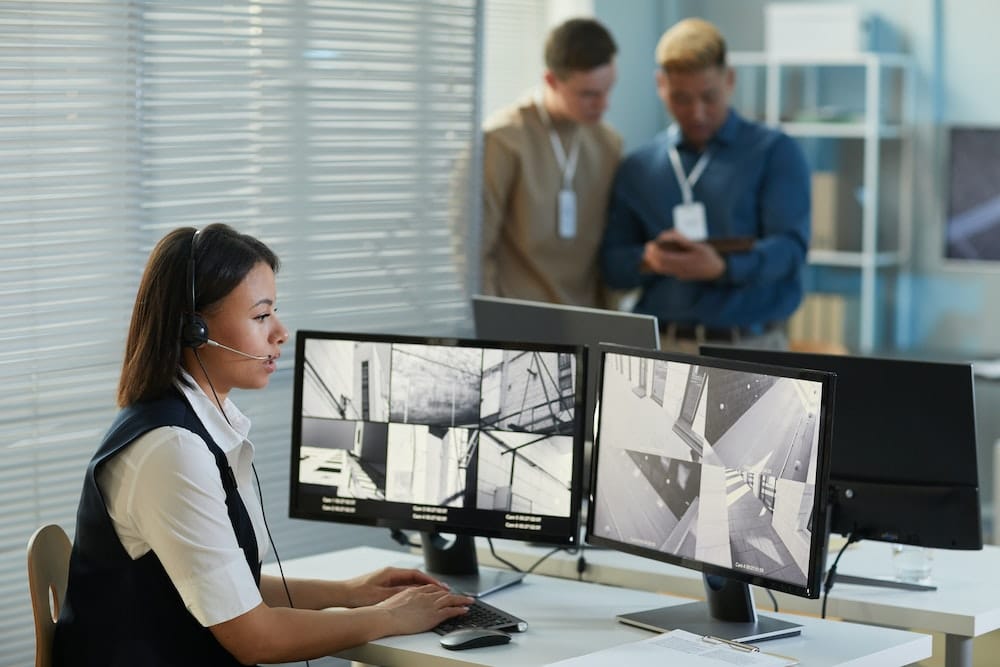In a world where the need for public safety is crucial, advancements in technology present an interesting conundrum: how do we balance the pressing need for security and surveillance with our desire to maintain individual privacy?
A key player in this debate is the use of artificial intelligence (AI) in Closed Circuit Television (CCTV) systems. This article will delve into this intricate issue, exploring the potential of AI-enhanced CCTV systems in improving public safety, the ethical considerations surrounding data privacy, and ways to ensure it is used responsibly.
Avez-vous vu cela : How does the New Zealand eTA Assistant app help simplify administrative formalities?
The Emergence of AI-Enhanced CCTV Systems for Public Safety
We live in a time of rapid technological growth, where developments that were once thought to be science fiction are now becoming reality. One such innovation is the integration of AI technology into CCTV surveillance systems. This section will provide an overview of how these systems work, their potential in enhancing public safety, and the critical role of real-time video analytics.
AI-enhanced CCTV systems use advanced algorithms to identify and analyze patterns in video data. They have the abilities to detect suspicious activities and recognize individuals in real-time. This real-time analysis is key to enhancing public safety, as it allows for immediate action in emergency situations.
Cela peut vous intéresser : How to Implement Sustainable Farming Practices in Small-scale UK Agriculture?
Moreover, these systems are equipped with facial recognition technology, which can identify individuals in crowded public places. This can be crucial in identifying potential threats and preventing crimes before they occur. However, this does carry the risk of intruding on personal privacy, which will be discussed further in the next section.
Balancing Surveillance with Individual Privacy
While the potential of AI-enhanced CCTV systems in improving safety is evident, concerns about individual privacy remain. The ethical implications of surveillance technology are complex, with the potential for misuse of data. In this section, we will discuss these concerns and explore possible solutions.
Privacy advocates argue that facial recognition and other data analytics used by these systems may infringe on individuals’ rights to privacy. For instance, the ability to track an individual’s whereabouts in real-time has potential for misuse, especially if the data falls into the wrong hands. There are also concerns about the accuracy of facial recognition technology, which may lead to false identifications.
To strike a balance, it’s important to establish regulations and guidelines for using these systems. This includes defining the legal and ethical use of this technology, implementing measures to secure sensitive data, and providing transparency in how this data is used.
Ensuring the Ethical Use of AI-Enhanced CCTV Systems
Setting aside the potential risks, it’s undeniable that AI-enhanced CCTV systems offer immense benefits in terms of public safety. But to truly harness these benefits, it’s vital to ensure their ethical use. This section will outline key steps that should be taken to achieve this.
Firstly, the companies that design and operate these systems should adhere to strict ethical standards. This includes ensuring the accuracy of their technology to prevent false identifications and taking robust measures to secure the data they collect.
Secondly, governments should establish clear regulations on the use of this technology. This includes setting limits on the amount of time data can be stored and the purposes for which it can be used.
Finally, the public should be educated about these systems. This includes informing them about how their data is used and the measures in place to protect their privacy.
The Future of AI-Enhanced CCTV Systems
So, what does the future look like for AI-enhanced CCTV systems? Will they continue to advance, providing ever more sophisticated tools for public safety? Or will concerns about privacy and ethical use slow their progress? In this section, we’ll explore these questions.
It’s likely that these systems will continue to evolve, with advancements in AI and data analytics offering ever more powerful tools for surveillance and public safety. For example, we may see systems that can predict potential crimes before they occur, or even identify individuals based on their behavior, rather than their physical appearance.
However, as these systems become more sophisticated, the potential for misuse and privacy infringement also grows. It’s therefore vital that we continue to engage in a dialogue about the ethical use of this technology, and ensure that robust regulations and safeguards are in place.
While the future of AI-enhanced CCTV systems may be uncertain, one thing is clear: they have the potential to significantly improve public safety, if used responsibly. By striking a balance between security and privacy, we can harness the power of this technology, without compromising our individual freedoms.
Navigating Legal and Social Implications of AI-Enhanced CCTV Systems
In the quest for enhanced public safety, integrating artificial intelligence in CCTV systems is an innovative step. However, this integration brings along a spectrum of legal and social implications. This section will explore these implications and suggest measures to address them.
Certainly, facial recognition technology in CCTV systems can aid public safety by identifying potential threats in crowded places or detecting suspicious activities. But this technology’s potential misuse, especially in the hands of law enforcement, can infringe on civil liberties. For example, inaccurate facial recognition can lead to wrongful arrests, and tracking an individual’s whereabouts can be seen as an invasion of privacy.
There’s also the concern about predictive policing, where AI-aided surveillance systems predict potential crimes based on collected data. While this might seem like a smart strategy for crime prevention, it can reinforce biased policing if the data fed into the system is skewed. Furthermore, it could potentially criminalize innocent behavior, causing undue harm.
To navigate these challenges, solid legal frameworks and social understanding are necessary. Strict regulations on the use of recognition technology in video surveillance need to be established, including laws that define the duration for storing personal data and rules that prevent misuse of this data. Public discourse is equally essential to address social concerns and form an understanding that respects both public safety and individual liberties.
Conclusion – Striking the Balance for Responsible AI-Enhanced CCTV Systems
While AI-enhanced CCTV systems have brought a new dimension to public safety with real-time video analytics, they also stir up concerns about privacy and civil liberties. Striking the right balance, therefore, is a critical challenge that needs to be addressed.
Facial recognition, predictive policing, and other AI features in CCTV cameras offer potential security solutions. Yet, the misuse of these security systems, particularly the unethical handling of personal data and potential security threats, remain significant concerns. Therefore, the future of these systems lies not just in technological advancements but also in setting robust ethical, legal, and social standards.
Companies involved in the design and operation of these systems need to ensure the accuracy of their technology and secure the data they collect. Governments have a vital role in setting clear regulations and civil liberties need to be respected. Moreover, public awareness and understanding of this technology are crucial to ensure responsible use.
In conclusion, while AI-enhanced CCTV systems hold immense potential for improving public safety, their success rests upon responsible and ethical use. By prioritizing both security measures and privacy concerns, we can leverage the power of this technology without infringing on individual freedoms.






